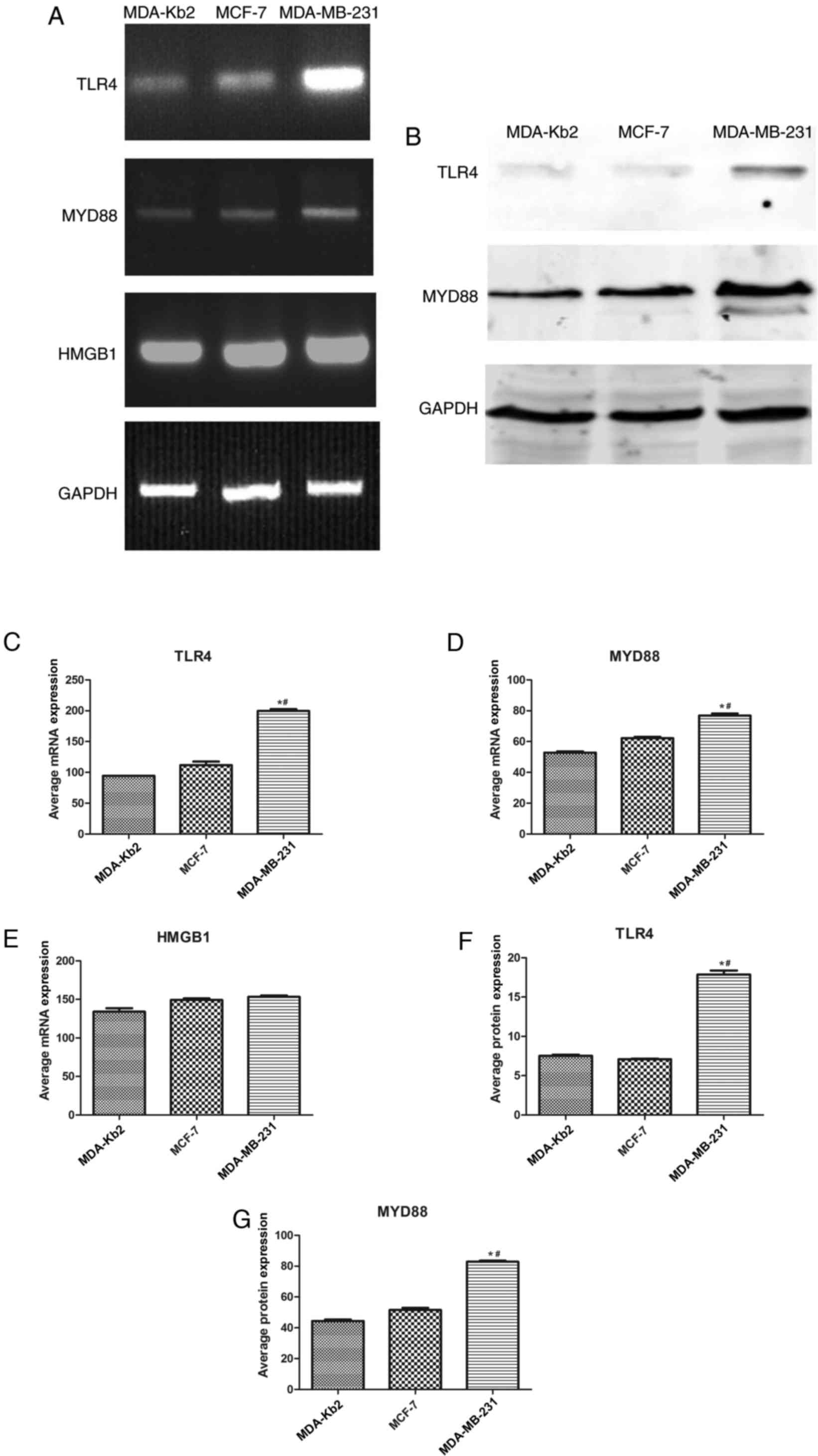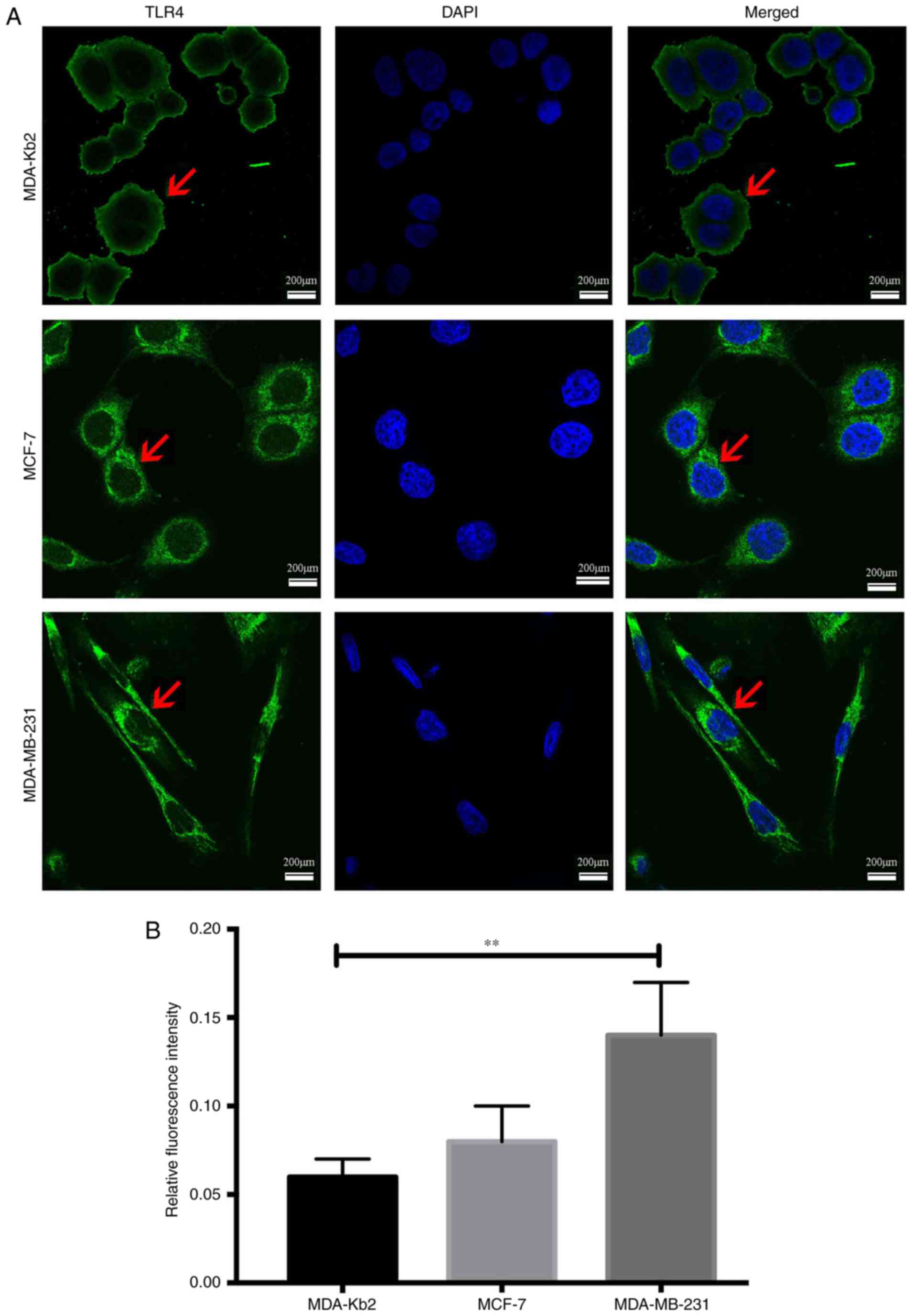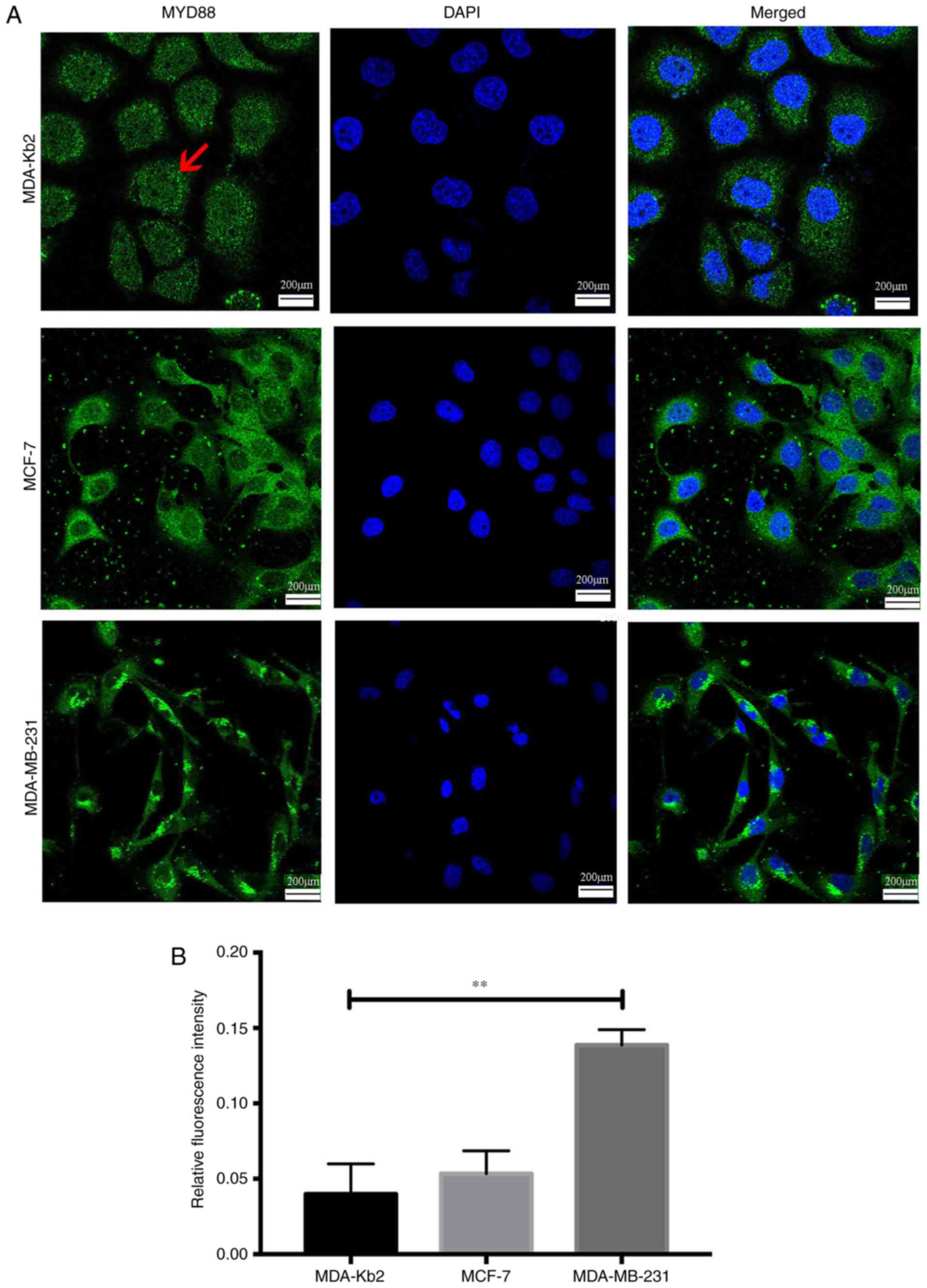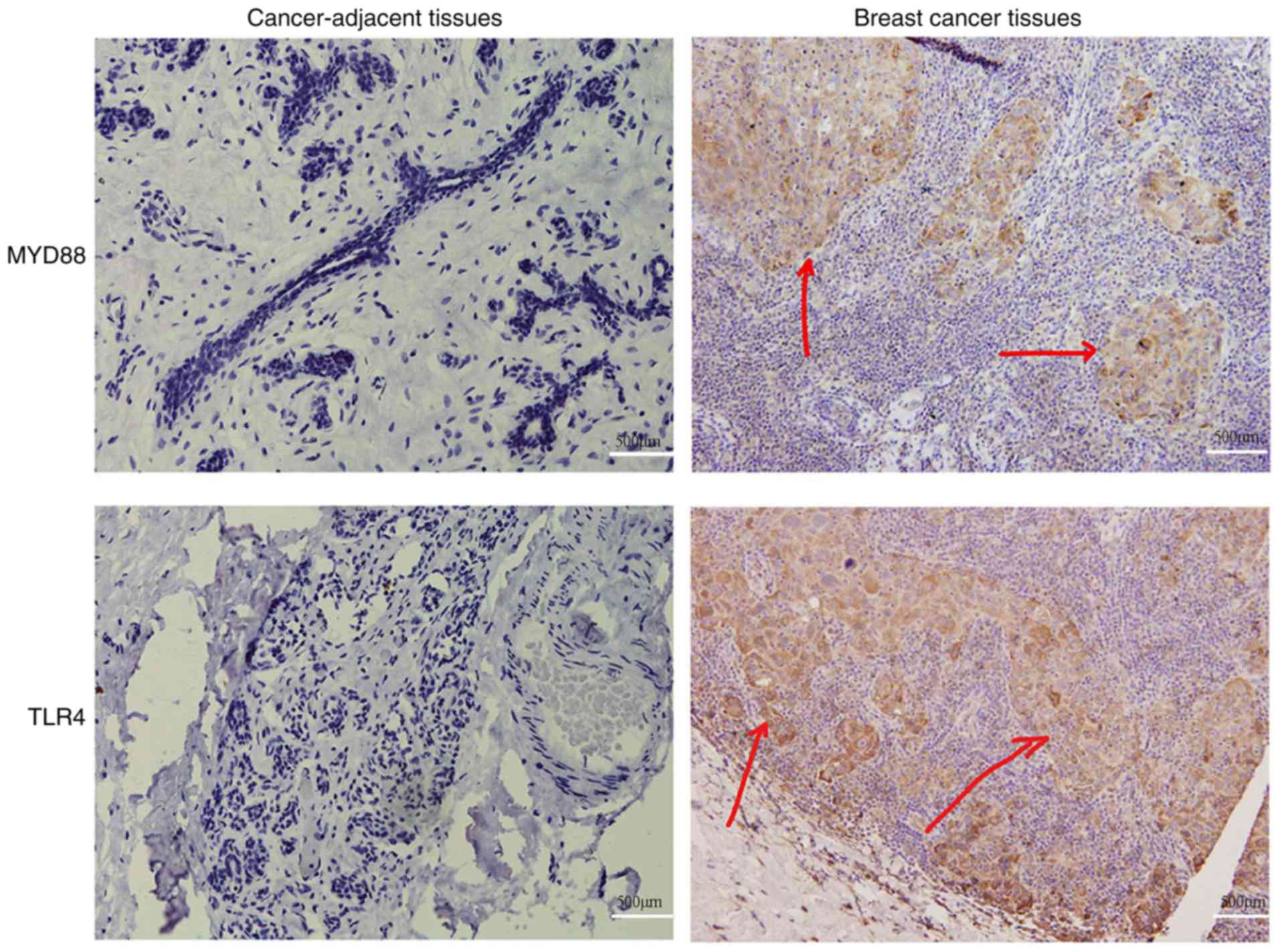|
1
|
Siegel R, Ma J, Zou Z and Jemal A: Cancer
statistics, 2014. CA Cancer J Clin. 64:9–29. 2014. View Article : Google Scholar : PubMed/NCBI
|
|
2
|
Dall GV and Britt KL: Estrogen effects on
the mammary gland in early and late life and breast cancer risk.
Front Oncol. 7:1102017. View Article : Google Scholar : PubMed/NCBI
|
|
3
|
Zhou PT, Li B, Ji J, Wang MM and Gao CF: A
systematic review and meta-analysis of the association between OGG1
Ser326Cys polymorphism and cancers. Med Oncol. 32:4722015.
View Article : Google Scholar : PubMed/NCBI
|
|
4
|
Liu YL, Zhang HM, Pan HM, Bao YH, Xue J,
Wang TC, Dong XC, Li XL and Bao HG: The relationship between
apolipoprotein E gene ε2/ε3/ε4 polymorphism and breast cancer risk:
A systematic review and meta-analysis. Onco Targets Ther.
9:1241–1249. 2016. View Article : Google Scholar : PubMed/NCBI
|
|
5
|
Falzon C, Radel R, Cantor A and
d'Arripe-Longueville F: Understanding narrative effects in physical
activity promotion: The influence of breast cancer survivor
testimony on exercise beliefs, self-efficacy, and intention in
breast cancer patients. Support Care Cancer. 23:761–768. 2015.
View Article : Google Scholar : PubMed/NCBI
|
|
6
|
Morrow RJ, Etemadi N, Yeo B and Ernst M:
Challenging a misnomer? The role of inflammatory pathways in
inflammatory breast cancer. Mediators Inflamm. 2017:47548272017.
View Article : Google Scholar : PubMed/NCBI
|
|
7
|
Jiang A, Zhao H, Cai J and Jiang WG:
Possible effect of muscle-relaxant anaesthetics on invasion,
adhesion and migration of breast cancer cells. Anticancer Res.
36:1259–1265. 2016.PubMed/NCBI
|
|
8
|
Chen JC, Chang NW, Chung JG and Chen KC:
Saikosaponin-A induces apoptotic mechanism in human breast
MDA-MB-231 and MCF-7 cancer cells. Am J Chin Med. 31:363–377. 2003.
View Article : Google Scholar : PubMed/NCBI
|
|
9
|
Yang S, Zhou Q and Yang X: Caspase-3
status is a determinant of the differential responses to genistein
between MDA-MB-231 and MCF-7 breast cancer cells. Biochim Biophys
Acta. 1773:903–911. 2007. View Article : Google Scholar : PubMed/NCBI
|
|
10
|
El Guerrab A, Cayre A, Kwiatkowski F,
Privat M, Rossignol JM, Rossignol F, Penault-Llorca F and Bignon
YJ: Quantification of hypoxia-related gene expression as a
potential approach for clinical outcome prediction in breast
cancer. PLoS One. 12:e01759602017. View Article : Google Scholar : PubMed/NCBI
|
|
11
|
Noh WC, Kim YH, Kim MS, Koh JS, Kim HA,
Moon NM and Paik NS: Activation of the mTOR signaling pathway in
breast cancer and its correlation with the clinicopathologic
variables. Breast Cancer Res Treat. 110:477–483. 2008. View Article : Google Scholar : PubMed/NCBI
|
|
12
|
Zhou Y, Kipps TJ and Zhang S: Wnt5a
signaling in normal and cancer stem cells. Stem Cells Int.
2017:52952862017. View Article : Google Scholar : PubMed/NCBI
|
|
13
|
Boyault S, Drouet Y, Navarro C, Bachelot
T, Lasset C, Treilleux I, Tabone E, Puisieux A and Wang Q:
Mutational characterization of individual breast tumors: TP53 and
PI3K pathway genes are frequently and distinctively mutated in
different subtypes. Breast Cancer Res Treat. 132:29–39. 2012.
View Article : Google Scholar : PubMed/NCBI
|
|
14
|
Mandal A, Bhatia D and Bishayee A:
Anti-inflammatory mechanism involved in pomegranate-mediated
prevention of breast cancer: The role of NF-κB and Nrf2 signaling
pathways. Nutrients. 9:E4362017. View Article : Google Scholar : PubMed/NCBI
|
|
15
|
Orlowski RZ and Dees EC: The role of the
ubiquitination-proteasome pathway in breast cancer: Applying drugs
that affect the ubiquitin-proteasome pathway to the therapy of
breast cancer. Breast Cancer Res. 5:1–7. 2003. View Article : Google Scholar : PubMed/NCBI
|
|
16
|
Castrellon AB: Novel strategies to improve
the endocrine therapy of breast cancer. Oncol Rev. 11:3232017.
View Article : Google Scholar : PubMed/NCBI
|
|
17
|
Kadowaki N, Ho S, Antonenko S, Malefyt RW,
Kastelein RA, Bazan F and Liu YJ: Subsets of human dendritic cell
precursors express different toll-like receptors and respond to
different microbial antigens. J Exp Med. 194:863–869. 2001.
View Article : Google Scholar : PubMed/NCBI
|
|
18
|
Li Z, Block MS, Vierkant RA, Fogarty ZC,
Winham SJ, Visscher DW, Kalli KR, Wang C and Goode EL: The
inflammatory microenvironment in epithelial ovarian cancer: A role
for TLR4 and MyD88 and related proteins. Tumour Biol.
37:13279–13286. 2016. View Article : Google Scholar : PubMed/NCBI
|
|
19
|
Harberts E, Zhou H, Fishelevich R, Liu J
and Gaspari AA: Ultraviolet radiation signaling through TLR4/MyD88
constrains DNA repair and plays a role in cutaneous
immunosuppression. J Immunol. 194:3127–3135. 2015. View Article : Google Scholar : PubMed/NCBI
|
|
20
|
d'Adhemar CJ, Spillane CD, Gallagher MF,
Bates M, Costello KM, Barry-O'Crowley J, Haley K, Kernan N, Murphy
C, Smyth PC, et al: The MyD88+ phenotype is an adverse prognostic
factor in epithelial ovarian cancer. PLoS One. 9:e1008162014.
View Article : Google Scholar : PubMed/NCBI
|
|
21
|
Huang JM, Zhang GN, Shi Y, Zha X, Zhu Y,
Wang MM, Lin Q, Wang W, Lu HY, Ma SQ, et al: Atractylenolide-I
sensitizes human ovarian cancer cells to paclitaxel by blocking
activation of TLR4/MyD88-dependent pathway. Sci Rep. 4:38402014.
View Article : Google Scholar : PubMed/NCBI
|
|
22
|
Echizen K, Hirose O, Maeda Y and Oshima M:
Inflammation in gastric cancer: Interplay of the
COX-2/prostaglandin E2 and Toll-like receptor/MyD88 pathways.
Cancer Sci. 107:391–397. 2016. View Article : Google Scholar : PubMed/NCBI
|
|
23
|
Gnanasekar M, Kalyanasundaram R, Zheng G,
Chen A, Bosland MC and Kajdacsy-Balla A: HMGB1: A promising
therapeutic target for prostate cancer. Prostate Cancer.
2013:1571032013. View Article : Google Scholar : PubMed/NCBI
|
|
24
|
Liu W, Zhang Z, Zhang Y, Chen X, Guo S,
Lei Y, Xu Y, Ji C, Bi Z and Wang K: HMGB1-mediated autophagy
modulates sensitivity of colorectal cancer cells to oxaliplatin via
MEK/ERK signaling pathway. Cancer Biol Ther. 16:511–517. 2015.
View Article : Google Scholar : PubMed/NCBI
|
|
25
|
Zhang QY, Wu LQ, Zhang T, Han YF and Lin
X: Autophagy-mediated HMGB1 release promotes gastric cancer cell
survival via RAGE activation of extracellular signal-regulated
kinases 1/2. Oncol Rep. 33:1630–1638. 2015. View Article : Google Scholar : PubMed/NCBI
|
|
26
|
Dong YD, Cui L, Peng CH, Cheng DF, Han BS
and Huang F: Expression and clinical significance of HMGB1 in human
liver cancer: Knockdown inhibits tumor growth and metastasis in
vitro and in vivo. Oncol Rep. 29:87–94. 2013. View Article : Google Scholar : PubMed/NCBI
|
|
27
|
Feng A, Tu Z and Yin B: The effect of
HMGB1 on the clinicopathological and prognostic features of
non-small cell lung cancer. Oncotarget. 7:20507–20519. 2016.
View Article : Google Scholar : PubMed/NCBI
|
|
28
|
Chen X, Zhao F, Zhang H, Zhu Y, Wu K and
Tan G: Significance of TLR4/MyD88 expression in breast cancer. Int
J Clin Exp Pathol. 8:7034–7039. 2015.PubMed/NCBI
|
|
29
|
Gkretsi V, Stylianou A, Louca M and
Stylianopoulos T: Identification of Ras suppressor-1 (RSU-1) as a
potential breast cancer metastasis biomarker using a
three-dimensional in vitro approach. Oncotarget. 8:27364–27379.
2017. View Article : Google Scholar : PubMed/NCBI
|
|
30
|
Sun N, Xu HN, Luo Q and Li LZ: Potential
indexing of the invasiveness of breast cancer cells by
mitochondrial redox ratios. Adv Exp Med Biol. 923:121–127. 2016.
View Article : Google Scholar : PubMed/NCBI
|
|
31
|
Denkert C, Liedtke C, Tutt A and von
Minckwitz G: Molecular alterations in triple-negative breast
cancer-the road to new treatment strategies. Lancet. 389:2430–2442.
2017. View Article : Google Scholar : PubMed/NCBI
|
|
32
|
Livak KJ and Schmittgen TD: Analysis of
relative gene expression data using real-time quantitative PCR and
the 2(-Delta Delta C(T)) method. Methods. 25:402–408. 2001.
View Article : Google Scholar : PubMed/NCBI
|
|
33
|
Kurien BT and Scofield RH: Western
blotting: An introduction. Methods Mol Biol. 1312:17–30. 2015.
View Article : Google Scholar : PubMed/NCBI
|
|
34
|
Milanezi F, Leitão D, Ricardo S, Augusto I
and Schmitt F: Evaluation of HER2 in breast cancer: Reality and
expectations. Expert Opin Med Diagn. 3:607–620. 2009. View Article : Google Scholar : PubMed/NCBI
|
|
35
|
Yang XL, Qi LG, Lin FJ and Ou ZL: The role
of the chemokine receptor XCR1 in breast cancer cells. Breast
Cancer (Dove Med Press). 9:227–236. 2017.PubMed/NCBI
|
|
36
|
Karlsson E, Pérez-Tenorio G, Amin R,
Bostner J, Skoog L, Fornander T, Sgroi DC, Nordenskjöld B, Hallbeck
AL and Stål O: The mTOR effectors 4EBP1 and S6K2 are frequently
coexpressed, and associated with a poor prognosis and endocrine
resistance in breast cancer: A retrospective study including
patients from the randomised Stockholm tamoxifen trials. Breast
Cancer Res. 15:R962013. View
Article : Google Scholar : PubMed/NCBI
|
|
37
|
Totsuka N, Kim YG, Kanemaru K, Niizuma K,
Umemoto E, Nagai K, Tahara-Hanaoka S, Nakahasi-Oda C, Honda S,
Miyasaka M, et al: Toll-like receptor 4 and MAIR-II/CLM-4/LMIR2
immunoreceptor regulate VLA-4-mediated inflammatory monocyte
migration. Nat Commun. 5:47102014. View Article : Google Scholar : PubMed/NCBI
|
|
38
|
Lucas K and Maes M: Role of the Toll Like
receptor (TLR) radical cycle in chronic inflammation: Possible
treatments targeting the TLR4 pathway. Mol Neurobiol. 48:190–204.
2013. View Article : Google Scholar : PubMed/NCBI
|
|
39
|
Xue X, Qiu Y and Yang HL: Immunoregulatory
role of MicroRNA-21 in macrophages in response to bacillus
calmette-guerin infection involves modulation of the TLR4/MyD88
signaling pathway. Cell Physiol Biochem. 42:91–102. 2017.
View Article : Google Scholar : PubMed/NCBI
|
|
40
|
Xu H, Hao S, Gan F, Wang H, Xu J, Liu D
and Huang K: In vitro immune toxicity of ochratoxin A in porcine
alveolar macrophages: A role for the ROS-relative TLR4/MyD88
signaling pathway. Chem Biol Interact. 272:107–116. 2017.
View Article : Google Scholar : PubMed/NCBI
|
|
41
|
Rahimifard M, Maqbool F, Moeini-Nodeh S,
Niaz K, Abdollahi M, Braidy N, Nabavi SM and Nabavi SF: Targeting
the TLR4 signaling pathway by polyphenols: A novel therapeutic
strategy for neuroinflammation. Ageing Res Rev. 36:11–19. 2017.
View Article : Google Scholar : PubMed/NCBI
|
|
42
|
Mazur-Bialy AI, Pocheć E and Zarawski M:
Anti-inflammatory properties of irisin, mediator of physical
activity, are connected with TLR4/MyD88 signaling pathway
activation. Int J Mol Sci. 18:E7012017. View Article : Google Scholar : PubMed/NCBI
|
|
43
|
Apetoh L, Ghiringhelli F, Tesniere A,
Obeid M, Ortiz C, Criollo A, Mignot G, Maiuri MC, Ullrich E,
Saulnier P, et al: Toll-like receptor 4-dependent contribution of
the immune system to anticancer chemotherapy and radiotherapy. Nat
Med. 13:1050–1059. 2007. View
Article : Google Scholar : PubMed/NCBI
|
|
44
|
An J, Li Z, Dong Y, Ren J and Guo K:
Methicillin-resistant staphylococcus aureus infection exacerbates
NSCLC cell metastasis by up-regulating TLR4/MyD88 pathway. Cell Mol
Biol (Noisy-le-grand). 62:1–7. 2016.PubMed/NCBI
|
|
45
|
Wang J, Dong B, Tan Y, Yu S and Bao YX: A
study on the immunomodulation of polysaccharopeptide through the
TLR4-TIRAP/MAL-MyD88 signaling pathway in PBMCs from breast cancer
patients. Immunopharmacol Immunotoxicol. 35:497–504. 2013.
View Article : Google Scholar : PubMed/NCBI
|
|
46
|
Aviello G, Corr SC, Johnston DG, O'Neill
LA and Fallon PG: MyD88 adaptor-like (Mal) regulates intestinal
homeostasis and colitis-associated colorectal cancer in mice. Am J
Physiol Gastrointest Liver Physiol. 306:G769–G778. 2014. View Article : Google Scholar : PubMed/NCBI
|


















